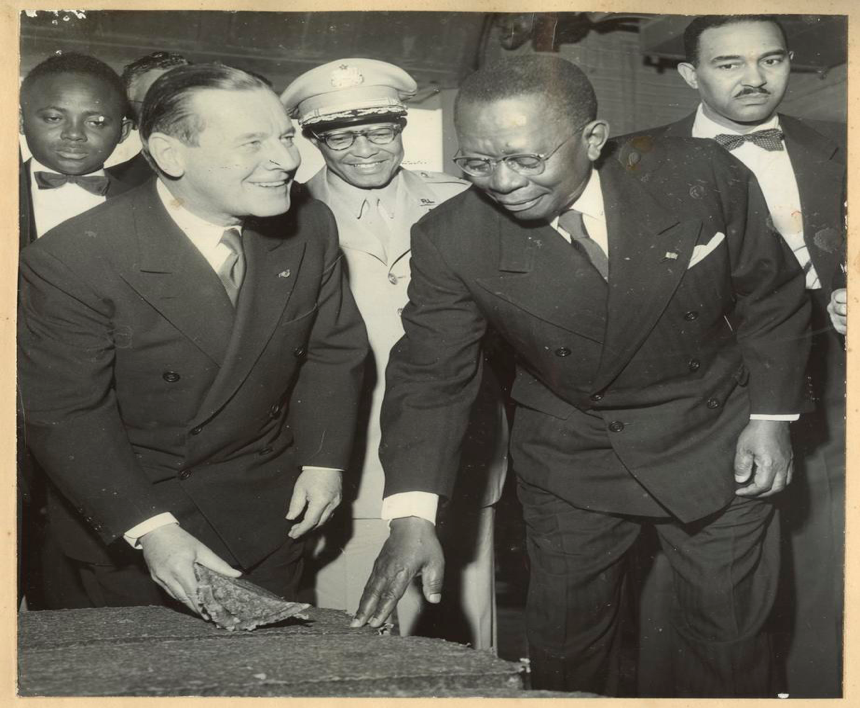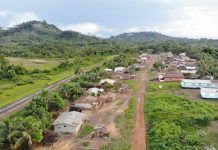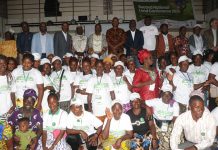Banner Image: Harvey Firestone left and Tubman Right. Picture credit: Indiana University
By Varney Kamara
MONROVIA– Since 1952, Liberia has commemorated November 29, the birthday of former President William V.S. Tubman, as a national holiday. Throughout this period, Liberians from all walks of life join in huge pomp and pageantry. In Maryland County, Tubman’s birthplace, thousands of people there usually decorate themselves with palm leaves as the echoes of traditional drumming trumpet across communities. In Monrovia and elsewhere, public buildings and businesses are shut down. Tubman became famous for his policies on unification and the economy, which earned him a great depth of respect home and abroad. He died on July 23, 1971.
But not many know that the former President was a lawyer for Firestone Liberia, a company whose nearly century-old rubber operations witnessed a huge land-grab and some of the worst human rights abuses in global concession history. The DayLight takes a look at Tubman’s controversial relationship with the company as the country celebrates the 126th birth anniversary of its longest-serving president.
Born William Vacanarat Shadrach Tubman in 1895 in the southeastern city of Harper, Maryland County, he began his political journey in 1912 as an assistant in a probate court, going to serve in Harper City as a councilman and teacher from 1914 and 1917. During this period, he read law. He was admitted into the Maryland County bar later in 1917 and appointed county attorney. Tubman became an attorney for Firestone in the 1920s. Firestone hired him, who was Senator at the time, and Edwin James Barclay, who was Secretary of State (Foreign Minister). Both men even traveled to Ohio, USA as part of the negotiation, according to Samuel P. Jackson in Rich Land Poor County: the Paradox of Poverty in Liberia. “The agreement did not require Firestone to provide education beyond the ninth grade for the children of plantation workers and, as a result, the system produced generations of tappers and low wage earners.”
The Firestone agreement, one of the worst concessions in human history, saw the company pen a 99-year contract with the government of Liberia for one million acres at the rate of six cents per acre. Hundreds of people, who had lived on the land for generations, were evicted. Villagers were pushed at the margins of the concession area, including what would become the Roberts International Airport (RIA) highway. If it were today, it would have been a violation of the Land Rights Act of 2018, the United Nations Principles on Business and Human Rights, and the UNESCO’s 1972 Convention on the Protection of the World Cultural and Natural Heritage Framework. Firestone is currently locked in a land dispute with Kpanyan over the 1926 land-grab dispute. Queezar, another community adjacent to the concession, which roughly translates in the Bassa language, “The educated people took our land,” is an everlasting lamentation of that human rights abuse. The Firestone agreement was extended in 2015 to 2046 after agreeing on an amendment with the government.
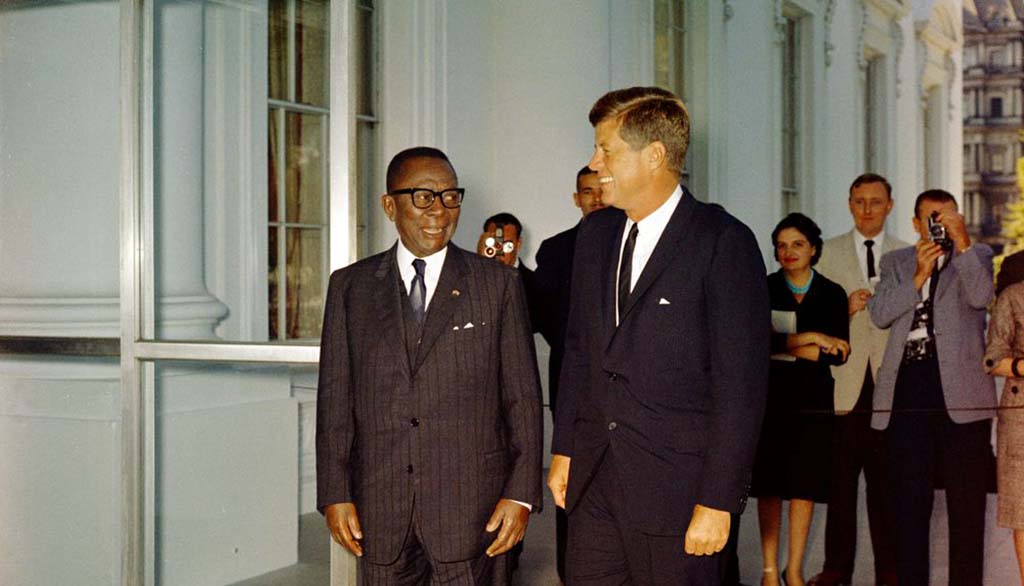
The 1926 deal did not prove only detrimental to villagers and workers. It did to the Liberian government as well. In the 1930s, Barclay, now the President, found himself in a stalemate with the very concessionaire whose deal he and Tubman had helped secure. The Great Depression of that decade brought the country to the verge of bankruptcy, and Firestone tried to persuade the United States government to compel Liberia to pay a US$5 million loan. The country had obtained the loan as part of the agreement. Then-U.S. President Franklin D. Roosevelt refused to interfere in Liberian internal affairs, writing in a memorandum to the State Department that, “At all times we should remember that (Harvey) Firestone went to Liberia at his own financial risk, and it is not the business of the State Department to pull his financial chestnut out of the fire except as a friend of the Liberian people.” In 1932, the Liberian Legislature passed the Moratorium Act, suspending payment of the Firestone loan until terms could be negotiated that were more in line with Liberia’s ability to pay. The U.S. suspended diplomatic relations but did not take further action. To date, there’s no record to show that the government paid back Firestone this money.
The loan had always been controversial, as Firestone had slipped in the agreement, which went on to be called clause “K,” in the last stages of the negotiation. It was the same as the US$8 million loan deal the Daniel E. Howard administration had obtained from the US government but was disapproved by Congress. Clause K had sparked protest in and outside the country.
The loan clause was only accepted after both parties saw the deal as necessary for their political economies. At the end of World War I, Great Britain—the leader of the global trade of rubber—decided to restrict the supply of the commodity on the world market. So, Firestone decided to come to Liberia to nullify Great Britain’s dominance of the global rubber market. Liberia’s tropical and very humid climate was an ideal area for growing rubber. It also found that Liberia had a cheap labor force, and the government too was eager to offer a concession in exchange for U.S. protection against colonial neighbors who were impatient to annex the country, a nation it helped establish in 1822. Moreover, Firestone wanted political control in Liberia to protect its long-term investment. Liberia owed more than US$1 million to British bankers. That was a safeguard to avoid the British direct meddling into Liberia’s internal affairs. Also, Firestone’s action was a strategic decision aimed at protecting its rubber production deal with the Liberian government. Similarly, the U.S. Government got interested and supported Firestone’s plans which included a promise to construct a major port. Firestone did not need a port to export the rubber from Liberia but merely proposed it to get the approval and support of the US State Department, which was particularly interested in a port on the West African coast as a station for naval use.
Tubman’s relationship with Firestone became even stronger when he became President of Liberia in 1944, defeating six candidates, including Clarence Lorenzo Simpson, his closest rival. While president, he owned the largest rubber plantation outside of Firestone, selling rubber to the company, a conflict of interest today under the Code of Conduct. His administration used martial law to recruit 300,000 casual laborers for Firestone—as per the agreement—up to the early 1960s. In fact, it even shut down a strike action on the plantation in 1950. It was only in 1962—after Portugal filed a complaint with the International Labor Organization (ILO)—that Liberia created a labor law that outlawed forced recruitment of workers. Up to the mid-2000s, the company’s workers lived in windowless houses, without running water and electricity. The administration of President Ellen Johnson Sirleaf at the time demanded it improve the workers’ welfare. Its relationship with workers inspired agricultural labor unions across the country and the creation of the Decent Work Act of 2015.
The Tubman-supported forced recruitment of workers was reminiscent of the Fernando-Po Crisis, where natives were adopted from their homes and farms and sent to the Fernando Po in today’s Equatorial Guinea to work on plantations. The Fernando Po Crisis had led to the resignation of former President Charles Dunbar Burgess King and Vice President Allen Yancy in 1930, and brought to power Barclay and later Tubman. Firestone would go on to pay rebels to protect its investments and operations while the First Liberian Civil War (1989-1997) raged, killing thousands of people, according to Liberia’s Truth and Reconciliation Commission (TRC).
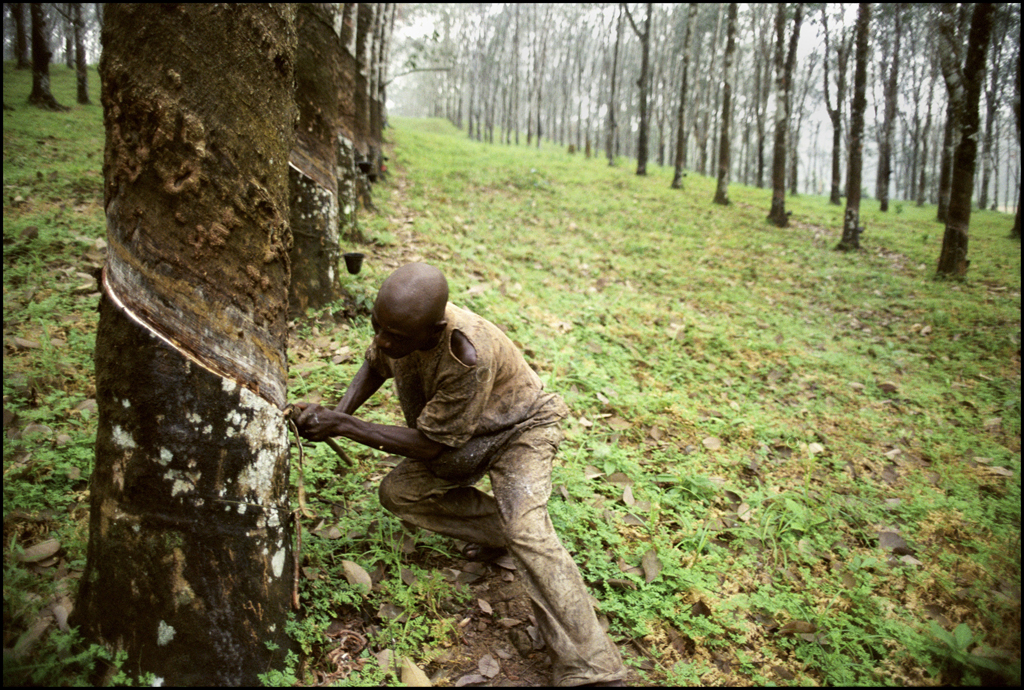
Despite these gross human rights abuses associated with Tubman and Firestone, both of them play important roles in Liberian society.
Regarded as the “father of modern Liberia,” Tubman was responsible for enacting many reforms during his 27-year rule (1944–1971). His administration built public schools and gave women the right to participate in politics. Many public infrastructures were also built during his regime, including bridges that linked interior Liberia to urban settlements. Tubman’s legacy also includes his “Open Door Policy,” which increased foreign investment in Liberia. By the time of his death, Liberia could boast the largest commercial fleet in the world and the world’s largest rubber industry, making the country the envy of many other African nations.
Firestone, on the other hand, is one of the largest contributors to Liberia’s economy. One of the country’s largest employers—a little over 6,000 workers—the company said it has spent more than US$2 billion in the country since the end of the Liberian Civil War.
This story is a part of The DayLight’s Human Rights Reporting Series.

